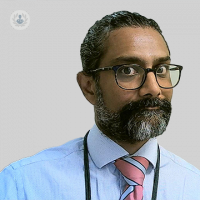control risk factors treating cardiovascular disease outset
Autore:CVDs are the biggest killers; more people die a year from cardiovascular-related diseases than from any other cause. In fact, CVD’s make up around 30% of all global deaths, and unfortunately, most of these take place in low- and middle-income houses.
However, cardiovascular problems can be prevented by applying simple changes in our lifestyles. And for those who already have the disease, it can be managed through early detection which greatly impacts survival rate. One of our top specialists in internal medicine and clinical pharmacology, Dr Yohan Samarasinghe, explains the risk factors and how important early detection and regular visits to a specialist are.

What are the risk factors of cardiovascular disease (CVD)?
It is a rather cruel trick of nature that the biggest non-communicable disease in the world, cardiovascular disease, has three major risk factors that are largely silent in their symptomatology, namely hypertension (raised blood pressure), diabetes (raised blood sugars) and hyperlipidaemia (predominantly raised cholesterol).
The fourth horseman of the apocalypse lures its victims in with an addictive substance called nicotine, that has an instant positive stimulatory effect, but then stabs you in the chest (both literally and metaphorically) with its more sinister passenger, which carries a more chronic and deadly cargo, the carcinogen tobacco.
Over time, the use of tobacco products - a major risk factor of cardiovascular disease - causes the cells that line blood vessels to become swollen and inflamed, resulting in narrow blood vessels and can lead to many cardiovascular conditions.
Optimising risk factors in patients
High blood pressure, high blood sugars (characteristic of diabetes) and high cholesterol are largely asymptomatic, meaning they don’t cause the sufferer any untoward issues unless they are drastically out of control. Subsequently, these conditions may not be identified for years and remain untreated, whilst surreptitiously doing their damage to the blood vessels of the circulatory system.
A large part of their being is related to the lifestyles we lead, which naturally, we have immense control of. However, when we are doing everything we can to improve ourselves, and our genes are construing to bring us down, then we have to rely on medical or drug therapy. There are plenty of viable options to optimise these individual risk factors so that they are well controlled and reduce the risk of CVD, but finding the correct one to suit the individual, can often be troublesome.
Why is treating diabetes and high blood pressure from the outset crucial?
Certainly, in regards to diabetes, we know that controlling the disease from the outset leads to a better overall prognosis (an enhanced lifespan with a delayed life expectancy and fewer complications), the so-called “legacy effect”. Conversely, over-tightening glucose treatment several years down the line may well harm survival. We do not know whether the same is true for hypertension or hyperlipidaemia, but we do have surrogate markers in the form of heart wall thickening and narrowing of the arteries around the heart and the neck, by cholesterol deposition relatively early on, that may suggest the same can be postulated.
Over treating blood pressure once you are much older can also have negative consequences like falls caused by postural hypotension (a fall in blood pressure on standing). The relative benefit of treating high cholesterol when one gets much older is also much smaller. Getting that initial, early treatment correct is therefore vital, as well as de-escalating therapy once the positive advantages of the therapy are superseded by the negative adverse effects of the drug.
Personalised medicine
The NHS is a wonderful and much sought-after system. It endeavours to deliver an even playing field of rationing for the nation amidst a finite financial resource pool. We have some marvellous organisations in our structure, such as the National Institute for Care and Clinical Excellence (NICE). These ensure an even distribution of resources and that its practitioners all abide by a common ethos of using medicines according to the best evidence of efficacy while maintaining a cost-effective approach to protect the system as a whole.
Although this is of course very noble, their premise of using the best possible evidence does mean that they are largely bound by large randomised controlled trials which look at populations and not individuals. Our role as specialists is to take that evidence and apply it to our patients so that the pros and cons of every drug are considered and a frank discussion takes place about the relative gains in morbidity and mortality versus the potential detrimental effects to one's current life.
How important is having frequent access to a medical specialist?
It is well documented that the NHS is underfunded and under-resourced with a chronic shortage of doctors, nurses and pharmacists. Subsequently, it becomes difficult to give our patients the time they need within the system and to review them often enough to manage these tricky conditions adequately. The situation has been compounded during the COVID-19 restrictions, where the lack of resources in the system meant that most elective outpatient visits were curtailed to not only prevent the spread of the coronavirus but to also allow healthcare workers to tend to the influx of unwell patients entering through A&E.
In an ideal world with infinite resources, patients would get to see their specialist very frequently over a few months, until they were stabilised on an appropriate and tolerated combination of therapies. Until science develops pharmacogenomics, i.e. the ability to know what drug is best from one's genes, this initial titration of medications may well be somewhat hit and miss. However, having that frequent access would mean that these problems would be quickly corrected with the least amount of fuss and control of diabetes, hypertension and lipids occurring early, thus preventing later complications and delaying death.
Dr Yohan Samarasinghe is a consultant in acute medicine, diabetes and clinical pharmacology. If you have any worries about the conditions mentioned in this article, visit his Top Doctors profile and talk to him via e-Consultation.


